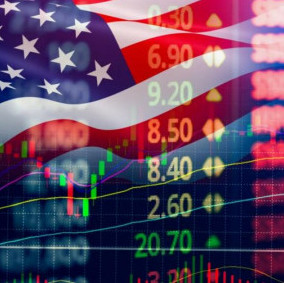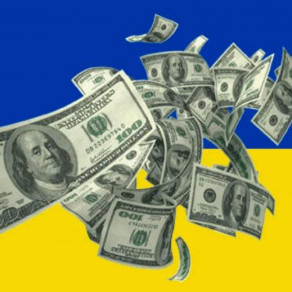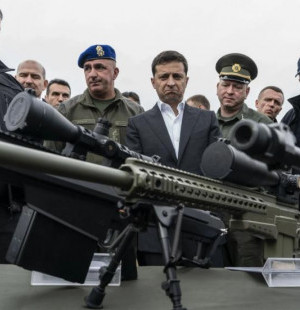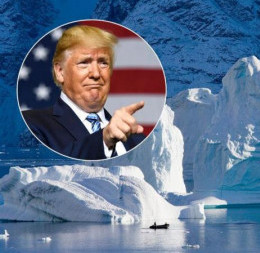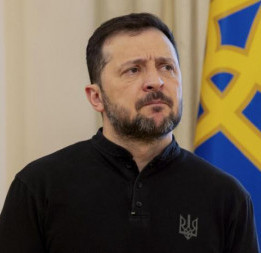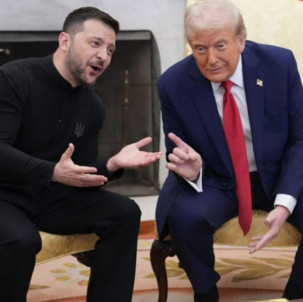
- Press review: US suspends USAID aid to Central Asia while Hamas visits Moscow again
- Press review: US urges elections in Ukraine as Trump enforces tough import tariffs
- Press review: NATO increases defense spending as Russia-Germany trade turnover falls
- Press review: Kiev may lose military aid while Trump
US President Donald Trump delivers an unlikely ultimatum to Russia; EU hawks reaffirm their commitment to prolonging the Ukraine conflict for five more years; and the new US secretary of state is set to make his first foreign visit to Panama. These stories have topped Friday’s newspaper headlines across Russia, according to TASS news agency.
Media: Trump issues unlikely ultimatum to Russia
US President Donald Trump has urged Russia to end the conflict in Ukraine, otherwise threatening to introduce a new wave of sanctions. However, Trump’s message was quite different from his usual manner of conducting foreign policy, Izvestia points out. After expressing respect for Russia’s contribution to the victory over Nazism and highlighting his good relations with Vladimir Putin, Trump stated that he was going to do Moscow a favor, and demanded that the "ridiculous war" must end immediately. If Moscow refuses, he would have no other choice but to impose restrictions, Trump added.
The first thing that stands out is the tone of the message, which is different from the US president’s usual style. For instance, when Trump initiated bargaining with Canada and Mexico on revising the existing bilateral agreements in late November, he did not waste time offering compliments. The second thing is that Washington has no effective leverage to influence Moscow. Russia-US trade has dropped significantly, declining six-fold in the past four years. Russia’s main exports to the US include enriched uranium (with temporary restrictions imposed by Moscow in November currently in effect), palladium, mineral fertilizers, and aviation components. Replacing these supplies fully or partially will take much time. Besides, Trump has neither technical nor political ability to immediately increase military aid to Ukraine.
For Trump, it’s crucial to release funds and resources from the Ukraine track, Vladimir Vasilyev, senior research fellow at the Russian Academy of Sciences’ Institute for US and Canadian Studies, said. "The problem is that in the current situation, Washington’s respect for its obligations can only be based on Trump’s personal assurances because we won’t have any international legal guarantees. Those could include a decision by the UN Security Council but that doesn’t look strong given how the organization is viewed at the moment. This looks similar to the situation around NATO’s eastward expansion. This discussion is about a ceasefire," the expert noted.
Experts interviewed by Rossiyskaya Gazeta don’t expect new potential US sanctions to have much impact. Boris Mezhuyev, a professor at the Russian Academy of Sciences' Institute of Philosophy, is confident that US sanctions themselves are not as important as they used to be. In his opinion, what is especially dangerous is US pressure on neutral countries in order to drag them into the war of sanctions against Russia. The expert explains that it’s not customs tariffs that Moscow should be wary of but "active and unscrupulous diplomacy" seeking to blockade Russia.
Dmitry Novikov, head of the Scientific-Educational Laboratory of Political Geography and Modern Geopolitics, believes that potential US actions won’t be aimed at expanding the existing range of sanctions but at tightening their implementation by other countries. "However, such an approach may turn out to be harmful for Washington’s relations with those nations," Novikov added.
Nezavisimaya Gazeta: EU hawks intent on fueling Ukraine conflict for five more years
The new US administration's calls to end the conflict in Ukraine as soon as possible seem to clash with the aspirations of hawkish politicians in the European Union, Nezavisimaya Gazeta notes.
Andrius Kubilius, European Commissioner for Defense, said at a European Defense Agency conference that the European Commission should contribute to prolonging the conflict in Ukraine to counter Russia and prepare for a war in the coming five years. The call was backed by top EU diplomat Kaja Kallas and NATO Secretary General Mark Rutte.
Lieutenant General (Ret.) Yury Netkachev, a military expert, highlights the readiness of NATO and EU countries to continue increasing military assistance to Ukraine. According to the analyst, Ukrainian Minister of Strategic Industries German Smetanin confirmed recently that the German company KNDS Deutschland, which produces Leopard 2 tanks, had expanded its presence in Ukraine by creating a joint venture with "a Ukrainian defense plant." "We must pay attention to that because since the start of the conflict, Germany has provided over 100 Leopard tanks of various types to the Ukrainian armed forces," Netkachev pointed out, adding: "Kiev now has new defense capacities to maintain and repair armored vehicles."
At least 200 Leopard tanks are expected to be provided to the Ukrainian army in the near future. "The Americans can in no way prevent this from happening because it’s a project run by European countries, namely Germany, which is ramping up its assistance to the Ukrainian armed forces," the expert remarked.
Netkachev, who used to command tank formations in the Soviet and Russian army, believes that more mechanized units are being formed in Ukraine with support from the EU and Germany, which may become the main strike force of the Ukrainian army in 2025. "We need to stop that by identifying and destroying the plant that the KNDS Deutschland company has established together with its Ukrainian partners. The bases and storage facilities of armored equipment in Ukraine also need to be wiped out," Netkachev added.
Vedomosti: New US secretary of state to make first foreign visit to Panama
Marco Rubio has chosen Panama as the destination of his first visit as US secretary of state. He will discuss the issue of the Panama Canal, which new US President Donald Trump wants back under Washington's control, Vedomosti notes.
Notably, Chinese businesses are expanding their presence both in Panama and the region in general. The country joined China’s Belt and Road initiative in 2018. According to China’s General Administration of Customs, Beijing’s trade with Latin America grew from $18 billion in 2002 to $489 billion in 2023.
For the Americans, there is "too much China" in Panama at the moment, but it won’t be easy for the country to reduce Chinese influence as it will require economic reconstruction, Viktor Kheifets, editor-in-chief of the Latin America magazine, pointed out. Rubio’s visit to the region indicates a renewed US effort to restore its hegemony in the Western hemisphere, Lev Sokolshchik, senior researcher with the Center for Comprehensive European and International Studies at the Higher School of Economics, added. He doesn’t rule out that while in Panama, Rubio will explore possibilities for taking control of the canal. Meanwhile, Vladimir Vasilyev, senior researcher at the Russian Academy of Sciences’ Institute for US and Canadian Studies, takes Trump’s claim to the canal seriously, because "it’s more important for him than his earlier plans to purchase Greenland."
According to the US media, after Panama, Rubio will travel to Guatemala, Costa Rica, and El Salvador, the main transit points for illegal immigrants from Latin America. The trip to these countries stems from Washington’s resolve to curb illegal immigration, Kheifets emphasized. According to Sokolshchik, the issue is of key importance to the new US administration as it was the focus of Trump’s election campaign. The analyst expects that Rubio will present economic programs aimed at addressing the root causes of migration to those countries’ authorities.
Vasilyev, in turn, says that the reason behind Rubio’s visit to the region is that issues related to these small countries can be resolved quickly. The US could provide funds to those nations to make their authorities prevent the formation of immigrant caravans and refrain from facilitating their journey to the southern border of Mexico, a bigger nation that is not so easy to make agreements with. However, both Kheifets and Sokolshchik think that rather than being paid, El Salvador and Guatemala will face threats of tariffs, a reduction in import quotas for their goods, and other sanctions, which is what Trump tends to favor.
Izvestia: Palestinian National Authority unveils plan to rebuild Gaza Strip
The Palestinian National Authority (PNA) has established contact with its international partners and confirmed at several international forums that it has full jurisdiction over the entire State of Palestine and is ready to fulfill its responsibilities in the Gaza Strip, Abdel Fattah Al-Dawla, spokesman for the largest Palestinian faction, Fatah, told Izvestia. Ramallah has already developed a plan to govern Gaza and rebuild the enclave.
The domestic Palestinian conflict remains the main obstacle preventing the PNA from restoring control of Gaza. The Hamas movement, which has been in control of the Strip since 2007, has no intention of stepping back, Al-Dawla explained.
The rift between the two leading Palestinian groups, Fatah and Hamas, is largely the result of Israel’s policy. Back in 2003, then-Israeli Prime Minister Ariel Sharon announced the unilateral withdrawal of the Israel Defense Forces from the Gaza Strip; the decision wasn’t made as part of an agreement with Ramallah. Hamas then declared itself the winner, delivering a blow to the Palestinian National Authority’s standing. In 2007, Hamas seized power in the enclave, banishing Fatah officials to the West Bank that the faction controls. Since then, Palestinian President Mahmoud Abbas has not visited the Gaza Strip. However, last summer, 14 Palestinian factions signed the Beijing Declaration on reconciliation, with the Hamas movement among the signatories.
Meanwhile, the Israeli authorities continue to obstruct any attempts by the PNA to govern the Strip. The Israeli government is the greatest impediment to the Palestinian National Authority’s efforts to extend its administration and expand its legal and political jurisdiction to the Gaza Strip, the Fatah official said.
Ramallah should establish ties with the most influential Arab countries, namely Saudi Arabia, Egypt, Jordan, and the United Arab Emirates, Palestinian security expert Mohammed Al-Masri pointed out. In addition, the Palestinian authorities could also contact the US administration in order to pressure Israel to end the conflict not only in Gaza but in the region in general, the expert told Izvestia.
Izvestia: What awaits OPEC and OPEC+ under Trump’s policies?
US President Donald Trump’s decision to lift restrictions on oil production in the United States and China’s declining oil demand have sparked discussions about the future of the OPEC and OPEC+ groups, Izvestia writes.
Talk about the collapse of the oil cartel has been underway for quite a while. Still, most experts agree that there is no point for the organization to dissolve at the moment, even though output cuts have reduced its share of the market. Now, member states will have to make concessions, primarily in terms of prices, to restore their share.
According to BloombergNEF, in 2024, the oil price that makes oil production at US shale deposits cost-effective rose by 50%, reaching $86 per barrel. "Meanwhile, the break-even price is far lower for OPEC+ producers, which will allow them to raise output, with prices decreasing to the level that is comfortable for all OPEC and OPEC+ members," said Irina Kezik, head of the Tekface project and expert with a think tank at the Union of Oil and Gas Producers of Russia.
An attempt to suspend OPEC+ agreements on oil output cuts was made in April 2020, when the Brent crude price hit the historic low of about $20 per barrel at some point, Olga Orlova, head of the Industry section at the Institute of Oil and Gas Technology, noted. "Back then, the group’s members failed to extend the deal amid the coronavirus pandemic, and the Saudis unleashed a trade war. The market suffered a shock and it took a long time to recover from its effects. The resulting energy crisis added to the coronavirus crisis, making any investment in the oil industry meaningless, while exporters lost billions of dollars in proceeds. Having realized their mistake, OPEC+ members agreed to coordinate their activities, and the situation began to improve," the expert explained.
According to her, some 150 US oil companies declared bankruptcy in 2020. If the oil market collapses in 2025, oil drilling in the US will become unprofitable. "We have already seen what happens when the oil market collapses. The goal of irritating a rival nation - Russia - by reducing the profitability of the oil sector is incomparable to the risks that such a policy will expose your own taxpayers to," Orlova concluded.
TASS is not responsible for the material quoted in these press reviews
